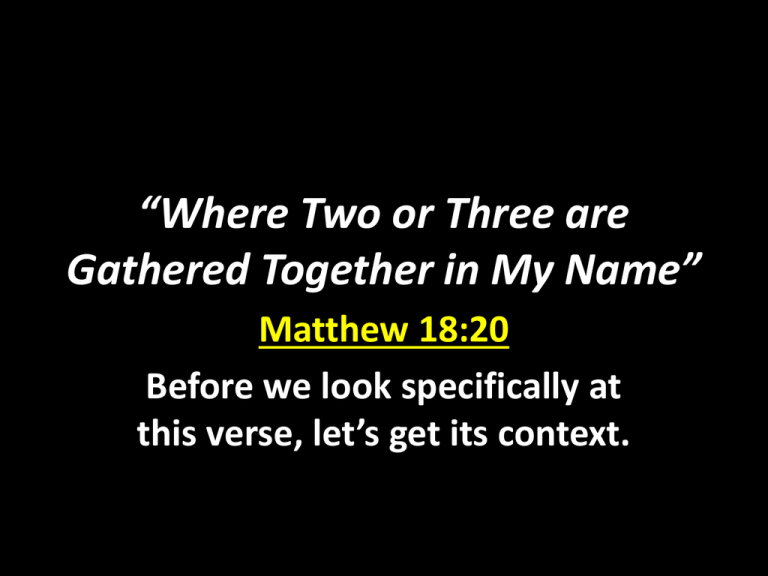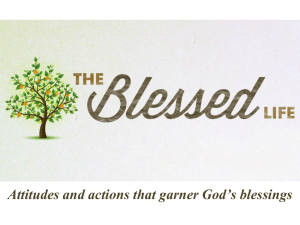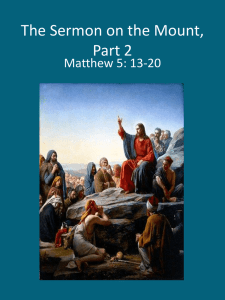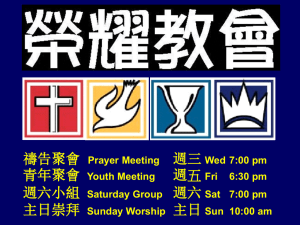File - Southside Church of Christ
advertisement

“Where Two or Three are Gathered Together in My Name” Matthew 18:20 Before we look specifically at this verse, let’s get its context. “Where Two or Three are Gathered” • Jesus is in Capernaum with His disciples, 17:24-27. • Though it is not specified here, other accounts of this occasion indicate that “the disciples” refers specifically to “the twelve,” Mk.9:35. • Again, though Matthew does not include it, they had been discussing/arguing who among them was “the greatest,” Mk.9:33-34. • Such sets the stage for what follows in the text of Matthew 18. “Where Two or Three are Gathered” • The question of v.1, posed by the 12, was not “Who among men is greatest in the kingdom?” • It was “Who among us is the greatest in kingdom?” • They had been told that Jesus would die, and be resurrected, Matt.17:9, their thoughts now seem to center on their own personal rank(s) within His kingdom. • They seem to have contracted “Comparative Competivitis” (this spiritual disease is still around today, though the vaccine is readily available from Gal.5:13-15,26; 6:4). “Where Two or Three are Gathered” • But Jesus used an object lesson in an attempt to quell the onset of the disease: He called “a child to Himself and stood him in their midst,” v.2; Then made His point, “Unless you are converted and become like children, you shall not enter the kingdom of heaven” (let alone have to debate and argue over your position in it!), v.3. They, the 12, would have to be converted (literally, to turn, as in 5:39 and 7:6; metaphorically, to change one’s mind, as in 27:3) and become like children: innocent & obedient, yes, but really, humble, v.4. “Where Two or Three are Gathered” • Then Jesus warns about stumbling-blocks: The reception of such (the humility of) a child, is the reception of Jesus- for He is humble, v.5; But if they (the 12, but we too), through our desires for greatness cause the stumbling of the humble, then woe to them/us, vv.6-7. It would be better to be a one-handed, one-footed, and one-eyed fellow than to be proud, self-centered, and competitive, vv.8-9. Are personal guardian angels taught in v.10? Many believe so, I’m not so sure- but such is not the point of our consideration here. (Yep, I’m skipping it!) “Where Two or Three are Gathered” • Next, Jesus stresses the value of each humble child: With the parable of lost 1 of 99 sheep, vv.12-13; This is the second warning (the first was the angels of v.10) that they, the 12, had better not cause one of the humble to stumble through their lust for position and power in the kingdom, v.14. “Where Two or Three are Gathered” • So, instead of using the sin of your brother to elevate your estimation of yourself in the kingdom, go and restore him: By first going and reproving him in private (because you’re concerned with his salvation instead of your position), v.15; If that doesn’t work, take one or two with you to confirm the truth of the sin- again, for his benefit rather than your own, v.16; If that doesn’t work, then (and not before then) tell it to the church- but still for his good, v.17a; It that doesn’t work, then (and only then) is he to be rejected as unrepentant, v.17b (which is the first time in all of this that 99’s importance are considered, cp. 1Cor.5:6). “Where Two or Three are Gathered” • Now, Jesus speaks of their (still the 12) “authority” in the kingdom: Whatever they bound will have been bound in heaven, v.18a. Question: what did they, in the scenario presented in the previous verses, bind? Answer: God’s will in the proper regard and treatment of a little one who has gone astray or stumbled, vv.1217. These 12 men did not have carte blanche to make laws for God, and it is wrong to use this passage to indicate that they did, v.18 > 1Cor.2:11-16; 4:1-2! Their binding of anything was tied to the inspiration of the Spirit, cp. v.19 > Matt.16:18 > John 20:22-23. “Where Two or Three are Gathered” • Finally, v.20: “For where two or three of you have gathered together in My name, there I am in their midst.” Question: What does this have to do with a few Christians assembling to worship God, and Him being in their presence because of their intentions? Answer: Absolutely nothing- despite it being the application typically made of the passage. First, the context has to do with the twelve Apostles, not Christians. Second, the context has to do with applying the Spirit-given instructions of how to feel and treat an erring brother, not worship. Third, their being together has to do with agreement on what is the correct application of the Spirit’s instructions, not the proper spirit of worship and the results thereof, cf. Acts 15:6 > 7-11 > 13-15ff. Conclusions • V.20, like all others, must be kept in context to avoid reaching wrong conclusions and/or missing the point being made. • So, what points are being made in this context? Competitiveness and self-interests have no place in the kingdom. Humility is the mark of approval in God’s eyes. Causing another to stumble because of our pride and lustful desires is indeed serious business that will not be overlooked by God. God values every soul- even the one(s) that goes astray. God tells the humble person how to restore the lost. Any agreement or binding on earth has to be based on the inspiration of the Spirit. Matthew 18:20 is not talking about worship of even a few invoking the presence of God- He is always with us when we do His will.











